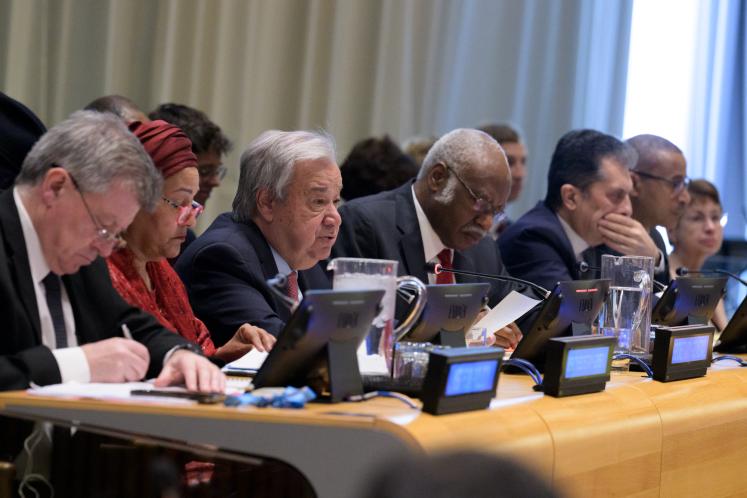This article was previously published in IPI Global Observatory.
The headlines are loud and clear: The UN is experiencing “its biggest single crisis in 80 years.” It is facing a “life-threatening” moment of crisis. It is in the midst of a “record-level cash crisis.” Worse, this is taking place during a global polycrisis of compounding shocks and fragmented responses. Add in the “triple planetary crisis,” a “food, energy, and finance” crisis, the seemingly endless crises in the Middle East, and it may feel there is no way out of a forever crisis.
This language feels necessary when we want leaders to take quick, forceful action. The UN has served for decades as the global voice of alarm, issuing warnings, declaring states of emergency, and mobilizing action to address natural disasters, pandemics, violent conflicts, and climate collapse. As we move inexorably above the global warming threshold of 1.5°C, it makes sense for the UN to call a “code red for humanity,” because it’s true. The billions of dollars of cuts to foreign aid this week are clearly catastrophic for humanitarian work around the world. And the innocent civilians in Gaza and Ukraine are certainly experiencing very real crises that should not be ignored.
But in the context of UN reform and the recently initiated UN80 process, a crisis vocabulary also can be limiting, generating self-protective, short-term responses at a moment when more transformative, sustained visions are needed. Instead of reforming the UN with the same language we use to describe an outbreak of war or a pandemic, it is time to shift to more constructive ideas like turbulence, adaptation, and renewal.
The Dark Side of Crisis Rhetoric
There is no question that crisis language can capture attention, signal urgency, and galvanize action, especially when time is short and stakes are high. But when used constantly and indiscriminately, it can also produce diminishing returns: Repeated warnings lose their impact or give a sense that they can be ignored. Audiences become desensitized. And when it comes to large organizations, studies have shown that repeated use of alarmism and blame-centered language can escalate reputational risk and entrench distrust instead of spurring collective action. Indeed, the kind of language that tends to accompany crisis announcements has been shown to reduce attention spans, increase polarization, and contribute to a more contested public discourse.
Worse, the UN is often blamed for the crises happening around the world, whether due to stagnation in the Security Council, slow responses to natural disasters, or ineffective action on climate change. Crisis language therefore has two sides: it is an important call for resources and quick action, but it also implicitly blames the UN for failing to deliver. Decades of this blame-centered language has contributed to a steep decline in confidence in and across the UN, low levels of trust in the organization, and a sense that it doesn’t do anything helpful. Framing an organization-wide reform process like UN80 as a crisis response is unlikely to alter these perceptions or generate a system-wide change.
A Strategic Reframe: Turbulence and Adaptation
A first step in reframing the discourse around the future of the UN could be to use language of turbulence and strategic uncertainty. A turbulent stream is not completely unpredictable or chaotic—the water continues to flow broadly in the same direction but with significant fluctuations in speed and intensity.
In global governance, turbulence is caused by high levels of interdependence across our social, economic, and technological spheres, meaning that small changes can have huge and largely unpredictable impacts around the world. Think of the global effects of a single ship blocking the Suez Canal in 2021, or the cascading effects of a chip factory fire in Japan that same year, or the global ripple effects of the war in Ukraine.
Turbulence demands that we understand complexity, novelty, instability, and rapid change. It is an acceptance that our normal assumptions about how change happens no longer apply; instead, we need to think about adaptation, experimentation, and rapid learning. Turbulence demands that we keep options open, constantly reexamine what we know, and recalibrate our approach to a world where volatility is the norm.
And it means we need to worry about path dependence. Making small, incremental changes via traditional reform is unlikely to alter the underlying rules and tendencies of our systems. Moving the stones in a stream won’t change its course. Recycling cans and turning off lights is not going to address climate change. Tinkering with the org chart of the UN system is unlikely to make it ready for tomorrow’s challenges.
The language of turbulence generates very different thinking than the language of crisis. If we’re in a crisis, then, as the secretary-general has repeatedly said, we either break down or break through. We should remember that the world “crisis” originates in the Greek idea of the turning point in a disease where a patient will either recover or decline toward death. Crisis language leads us to a binary world—we either succeed and the crisis disappears, or we fail and there is a total loss.
But we can’t afford a binary approach to the kinds of risks facing humanity today. We need thinking that pushes us toward creativity and adaptation. We need to shift away from reputational damage and survival toward the possibility of renewal and systems change.
Three Steps Forward: Adaptation, Renewal and Sustained Engagement
What might such a shift look like in the context of UN reform today? It could involve three steps:
- Recast the narrative from emergency to evolution: Rather than portraying UN80 as a lifeline for a sinking institution, the process could be framed as an intentional evolution of multilateralism in a turbulent world. This means embracing a forward-looking story—one in which the UN is not simply trying to fix what’s broken but is adapting to a new global reality of unpredictability, polycentric power, and shifting norms around legitimacy. Messaging should shift from defensive to generative: less “rescue the UN” and more “reimagine how to work in an interdependent, pluralistic world.” Words like “renew,” “rebuild,” and “adapt” can create space for inclusive imagination rather than fear-driven reform.
- Offer models of adaptation, especially from the Global South. Around the world, communities, cities, and small states are already experimenting with new governance models, from climate adaptation in island nations to tech-led democratic innovation in cities. These localized, often under-celebrated efforts can serve as living proof that adaptation is possible even amid instability. The UN80 process should support platforms (like this one) to share these stories, showing that resilience is not just reactive, but creative. Shifting the focus away from high-level dysfunction and toward frontline experimentation can both humanize the UN’s work and seed optimism in a space that too often feels stuck.
- Build participation through sustained dialogue, not event peaks. UN reform is frequently treated as a punctuated, high-stakes negotiation: a summit, a declaration, a breakthrough moment. But in turbulent systems, real change emerges through continuous feedback, learning, and iteration. Instead of building up toward a single moment of reform, the UN80 process should cultivate an ecosystem of ongoing participation: open channels for youth movements, civil society, and local actors to shape agendas before and beyond the summit. This means redesigning UN engagement to support adaptive dialogue, where consultation isn’t just performative and one-off but woven into decision-making cycles. This approach signals that the UN isn’t just asking the world to trust it; it’s ready to listen, adapt, and evolve with the world.
This is not a call to abandon urgency. Far from it. Rather, it is an appeal to elevate urgency into a language that can move us beyond the kind of reactive, short-term, self-protective responses that happen during a crisis.




